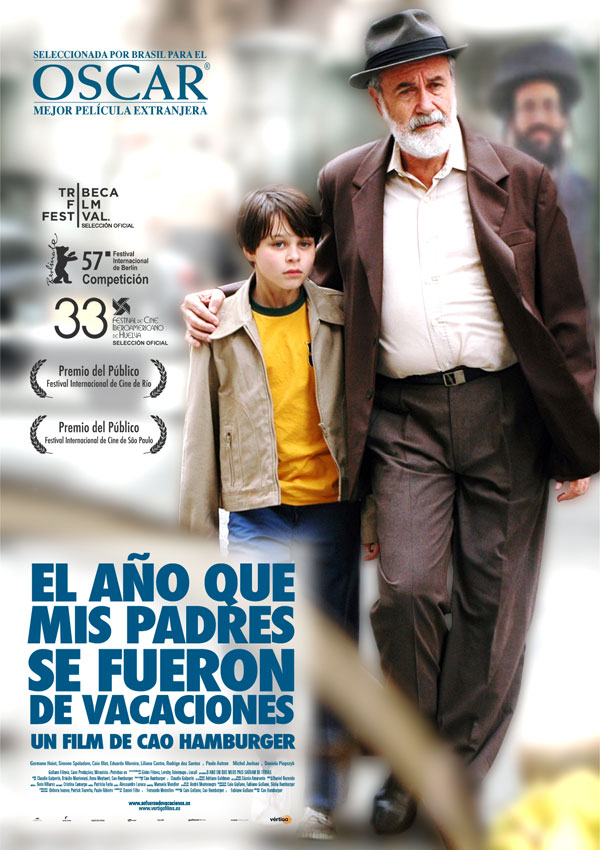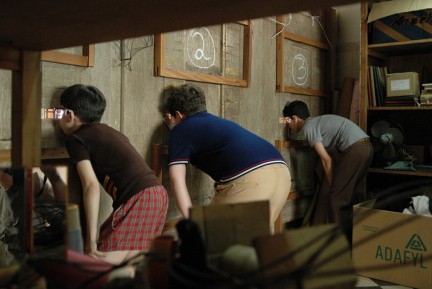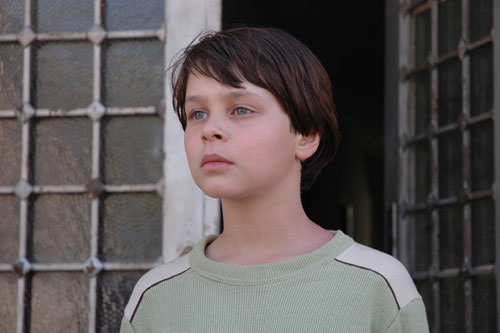When one is introduced, say, in the family of his partner, to avoid arousing resentment that can stain first impression, you should not talk about football, religion or politics. Cao Hamburger
is forget this advice and talk about all this but softly. I conveyed through an intimate and sentimental drama in São Paulo, in 1970, when the Brazil team that won the World Cup. To do this, with a hint of nostalgia but with a bittersweet feeling, tells the story of Mauro, a twelve year old boy should spend the entire year away from their parents and with her grandfather. The political and dictatorial forces their parents to wean them their son temporarily, while fate fatal, never will cause find her grandfather. This leaves Mauro in the hands of the Jewish community it belongs to the grandfather, where he will be cared for primarily by the neighbor, an elderly gentleman, unwilling to do so, but led by the rabbi of the community, who see the situation where Mauro is in parallel with the haphazard biography of Moses.
forget this advice and talk about all this but softly. I conveyed through an intimate and sentimental drama in São Paulo, in 1970, when the Brazil team that won the World Cup. To do this, with a hint of nostalgia but with a bittersweet feeling, tells the story of Mauro, a twelve year old boy should spend the entire year away from their parents and with her grandfather. The political and dictatorial forces their parents to wean them their son temporarily, while fate fatal, never will cause find her grandfather. This leaves Mauro in the hands of the Jewish community it belongs to the grandfather, where he will be cared for primarily by the neighbor, an elderly gentleman, unwilling to do so, but led by the rabbi of the community, who see the situation where Mauro is in parallel with the haphazard biography of Moses.
If football is omnipresent through the crowd of Mauro and religion shows a custom which makes the brush we paint the canvas landscape, politics is outside the field that is imaginable and described before strange behaviors of adults or shooting situations of repression are observed by Mauro. Brazil suffered the dictatorship since 1964 pushes the edges of the fictional representation and cracking these walls to establish through allusion and metaphor index its presence in the story.
The position taken is that of a few inches off the point of view, and set it from the perspective of cognitive and perceptual Mauro, a boy of twelve years. If we put some introductory titles at the beginning of the film in the situation then we will present the viewer is intended to see things as if Mauro. One option that may remind series The Wonder Years. We think that falls into a similar sentimental nostalgia, but here, the harsh social and personal context that our hero lives minimizes the effects of homesickness mechanisms for believing that any past was always better. Football and the victory of Brazil in the Copa act as a catalyst sweetener of a decisive breakthrough year for Mauro painful. However, this endearing patina itself that keeps close connections with the film Kamchatka (2002) where Marcelo Piña showed us the dictatorship in Argentina, indirectly, from the point of view of Harry, a child ten years.
 This option does not avoid falling into the common ground of films for children: the first love ( Hanna ), awakening to sex but not the somewhat bizarre dreamlike quality of Federico Fellini's Amarcord (1973) or Léolo (Jean Claude Lauzon, 1992). Everything in this film is soft, gentle lines. And as if to establish a synecdoche to focus on a Jewish neighborhood of Sao Paulo used to use plenty of close-ups close-ups and display understanding that each part contributes to the overall perception. Similarly, the portrait of a particular community will achieves the general picture of a city or a country.
This option does not avoid falling into the common ground of films for children: the first love ( Hanna ), awakening to sex but not the somewhat bizarre dreamlike quality of Federico Fellini's Amarcord (1973) or Léolo (Jean Claude Lauzon, 1992). Everything in this film is soft, gentle lines. And as if to establish a synecdoche to focus on a Jewish neighborhood of Sao Paulo used to use plenty of close-ups close-ups and display understanding that each part contributes to the overall perception. Similarly, the portrait of a particular community will achieves the general picture of a city or a country.
There is also an effort to make a compositional work in which the figures are viewed from unexpected angles, either from the reflection of a closet, or from the same handset, establishing the presence of another person in space a sustained effort of staging. Precisely intended to symbolize the ghosts of the dictatorship, that figure gripping spectrally.
And although the sport and movies are not usually good friends here football sign appears as a country's cultural identity. Alternate scenes are repetitive celebrating Brazil's victory: the rabbi and his relatives, women or people in the bar to emphasize how football that year was a sign of cohesion and also an outlet where people reach moments of happiness a harsh environment caused by the repression and lack of freedom of expression of a dictatorial government. Mauro
in childhood is like a bubble and even feel a sense of abandonment and denotes strange behavior is not able to conceptualize exactly what is happening. Not able to discern the magnitude of the gravity of the situation. He feels helpless, but nevertheless, lives dreaming football and stick to their immediate surroundings, families caring for you, Hanna, her friends, etc. Is in some way, what happened in Life is Beautiful (Roberto Benigni, 1998) , in which the father tries to convince the child, while in the camp, that this is a game in order to preserve the innocence of childhood. Just such ingenuity is what Mauro safeguards to be aware of the serious danger to their parents. Mauro
strange behavior is not able to conceptualize exactly what is happening. Not able to discern the magnitude of the gravity of the situation. He feels helpless, but nevertheless, lives dreaming football and stick to their immediate surroundings, families caring for you, Hanna, her friends, etc. Is in some way, what happened in Life is Beautiful (Roberto Benigni, 1998) , in which the father tries to convince the child, while in the camp, that this is a game in order to preserve the innocence of childhood. Just such ingenuity is what Mauro safeguards to be aware of the serious danger to their parents. Mauro
remember what I was saying his father figure of the goalkeeper in the lineup and will be with this figure to be identified. Ni with Pele or with Tostao, the stars of the selection. And is that the goalkeeper is a different player, because while others may make mistakes, no goalkeeper. Is there only goal expecting the worst. And if his father was always late everywhere, which means it is the figure of the exiled, those who take so long, never arrived. Manu
Argüelles ( The imaginary audience ) is
 forget this advice and talk about all this but softly. I conveyed through an intimate and sentimental drama in São Paulo, in 1970, when the Brazil team that won the World Cup. To do this, with a hint of nostalgia but with a bittersweet feeling, tells the story of Mauro, a twelve year old boy should spend the entire year away from their parents and with her grandfather. The political and dictatorial forces their parents to wean them their son temporarily, while fate fatal, never will cause find her grandfather. This leaves Mauro in the hands of the Jewish community it belongs to the grandfather, where he will be cared for primarily by the neighbor, an elderly gentleman, unwilling to do so, but led by the rabbi of the community, who see the situation where Mauro is in parallel with the haphazard biography of Moses.
forget this advice and talk about all this but softly. I conveyed through an intimate and sentimental drama in São Paulo, in 1970, when the Brazil team that won the World Cup. To do this, with a hint of nostalgia but with a bittersweet feeling, tells the story of Mauro, a twelve year old boy should spend the entire year away from their parents and with her grandfather. The political and dictatorial forces their parents to wean them their son temporarily, while fate fatal, never will cause find her grandfather. This leaves Mauro in the hands of the Jewish community it belongs to the grandfather, where he will be cared for primarily by the neighbor, an elderly gentleman, unwilling to do so, but led by the rabbi of the community, who see the situation where Mauro is in parallel with the haphazard biography of Moses. If football is omnipresent through the crowd of Mauro and religion shows a custom which makes the brush we paint the canvas landscape, politics is outside the field that is imaginable and described before strange behaviors of adults or shooting situations of repression are observed by Mauro. Brazil suffered the dictatorship since 1964 pushes the edges of the fictional representation and cracking these walls to establish through allusion and metaphor index its presence in the story.
The position taken is that of a few inches off the point of view, and set it from the perspective of cognitive and perceptual Mauro, a boy of twelve years. If we put some introductory titles at the beginning of the film in the situation then we will present the viewer is intended to see things as if Mauro. One option that may remind series The Wonder Years. We think that falls into a similar sentimental nostalgia, but here, the harsh social and personal context that our hero lives minimizes the effects of homesickness mechanisms for believing that any past was always better. Football and the victory of Brazil in the Copa act as a catalyst sweetener of a decisive breakthrough year for Mauro painful. However, this endearing patina itself that keeps close connections with the film Kamchatka (2002) where Marcelo Piña showed us the dictatorship in Argentina, indirectly, from the point of view of Harry, a child ten years.
 This option does not avoid falling into the common ground of films for children: the first love ( Hanna ), awakening to sex but not the somewhat bizarre dreamlike quality of Federico Fellini's Amarcord (1973) or Léolo (Jean Claude Lauzon, 1992). Everything in this film is soft, gentle lines. And as if to establish a synecdoche to focus on a Jewish neighborhood of Sao Paulo used to use plenty of close-ups close-ups and display understanding that each part contributes to the overall perception. Similarly, the portrait of a particular community will achieves the general picture of a city or a country.
This option does not avoid falling into the common ground of films for children: the first love ( Hanna ), awakening to sex but not the somewhat bizarre dreamlike quality of Federico Fellini's Amarcord (1973) or Léolo (Jean Claude Lauzon, 1992). Everything in this film is soft, gentle lines. And as if to establish a synecdoche to focus on a Jewish neighborhood of Sao Paulo used to use plenty of close-ups close-ups and display understanding that each part contributes to the overall perception. Similarly, the portrait of a particular community will achieves the general picture of a city or a country. There is also an effort to make a compositional work in which the figures are viewed from unexpected angles, either from the reflection of a closet, or from the same handset, establishing the presence of another person in space a sustained effort of staging. Precisely intended to symbolize the ghosts of the dictatorship, that figure gripping spectrally.
And although the sport and movies are not usually good friends here football sign appears as a country's cultural identity. Alternate scenes are repetitive celebrating Brazil's victory: the rabbi and his relatives, women or people in the bar to emphasize how football that year was a sign of cohesion and also an outlet where people reach moments of happiness a harsh environment caused by the repression and lack of freedom of expression of a dictatorial government. Mauro
in childhood is like a bubble and even feel a sense of abandonment and denotes
 strange behavior is not able to conceptualize exactly what is happening. Not able to discern the magnitude of the gravity of the situation. He feels helpless, but nevertheless, lives dreaming football and stick to their immediate surroundings, families caring for you, Hanna, her friends, etc. Is in some way, what happened in Life is Beautiful (Roberto Benigni, 1998) , in which the father tries to convince the child, while in the camp, that this is a game in order to preserve the innocence of childhood. Just such ingenuity is what Mauro safeguards to be aware of the serious danger to their parents. Mauro
strange behavior is not able to conceptualize exactly what is happening. Not able to discern the magnitude of the gravity of the situation. He feels helpless, but nevertheless, lives dreaming football and stick to their immediate surroundings, families caring for you, Hanna, her friends, etc. Is in some way, what happened in Life is Beautiful (Roberto Benigni, 1998) , in which the father tries to convince the child, while in the camp, that this is a game in order to preserve the innocence of childhood. Just such ingenuity is what Mauro safeguards to be aware of the serious danger to their parents. Mauro remember what I was saying his father figure of the goalkeeper in the lineup and will be with this figure to be identified. Ni with Pele or with Tostao, the stars of the selection. And is that the goalkeeper is a different player, because while others may make mistakes, no goalkeeper. Is there only goal expecting the worst. And if his father was always late everywhere, which means it is the figure of the exiled, those who take so long, never arrived. Manu
Trailer of the film:
No comments:
Post a Comment